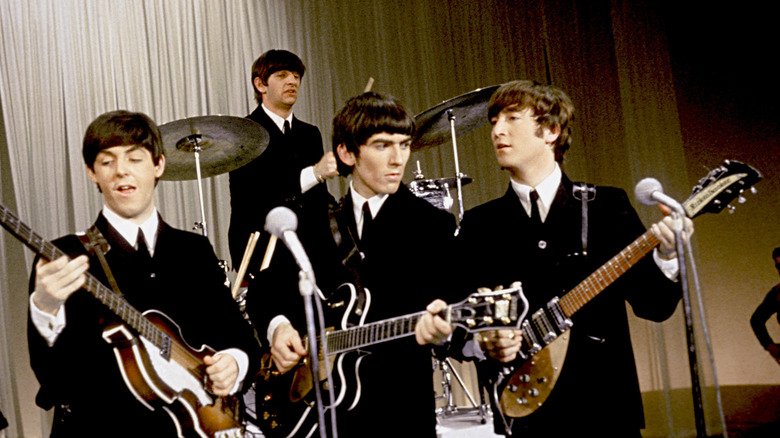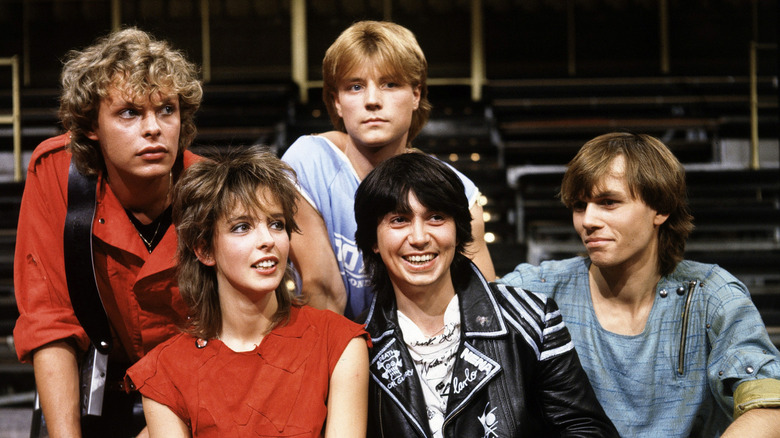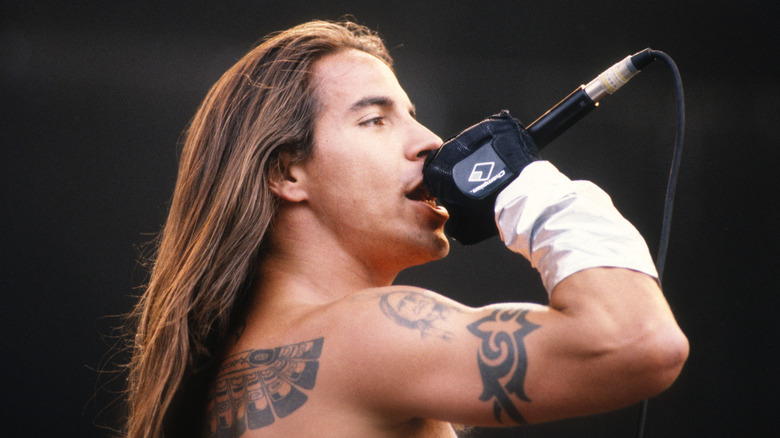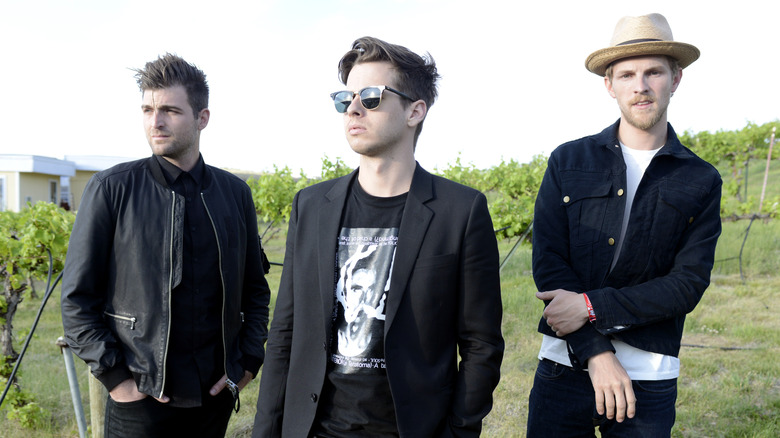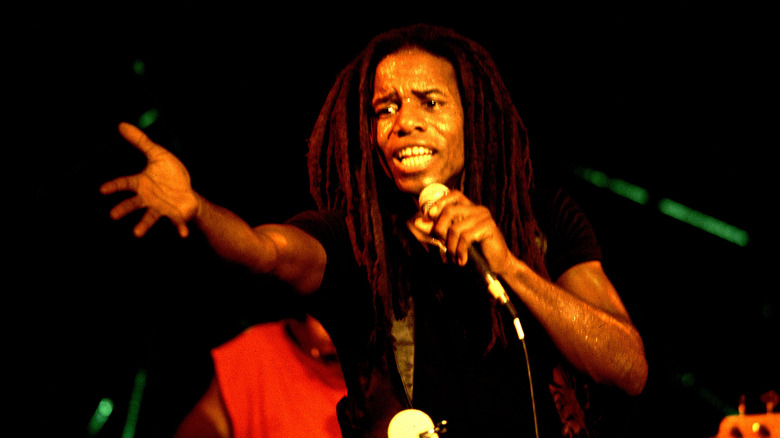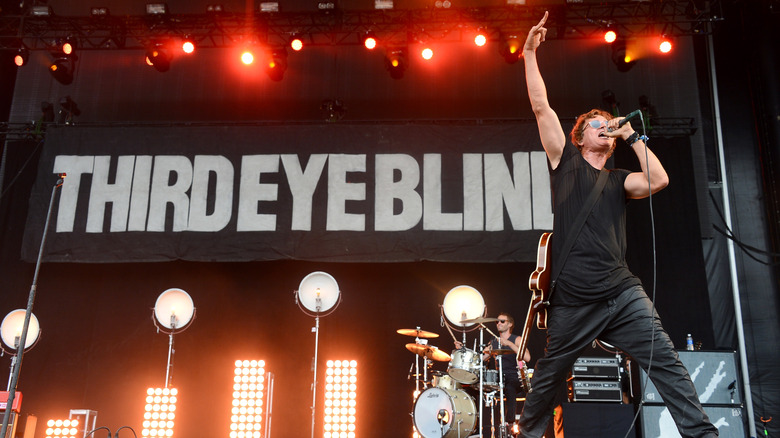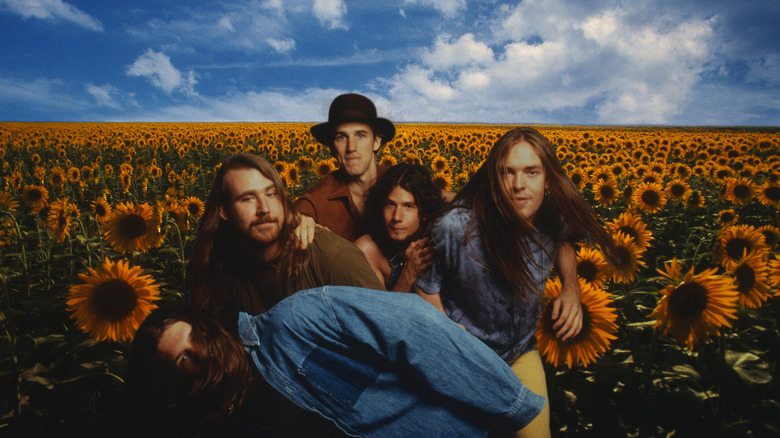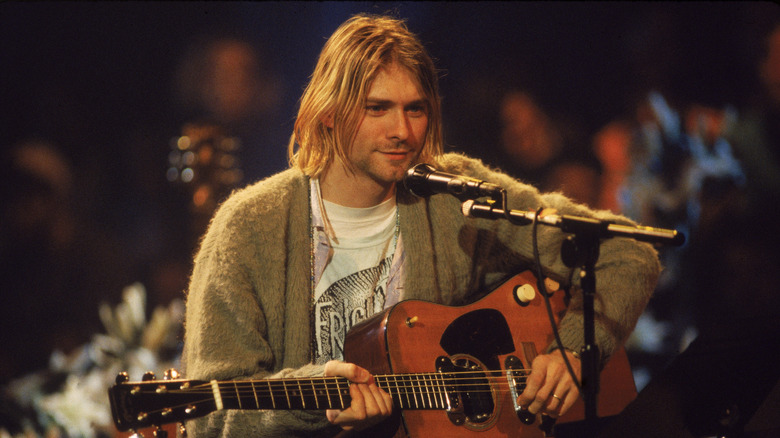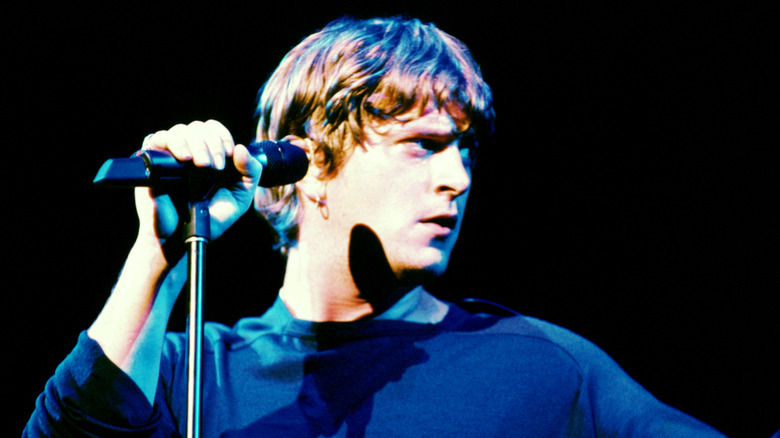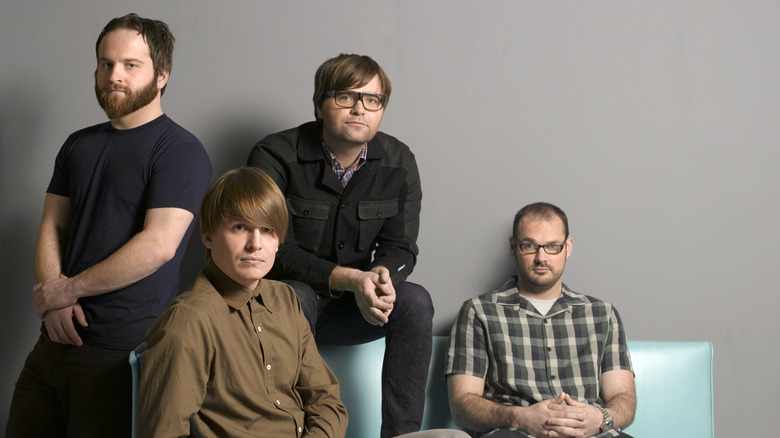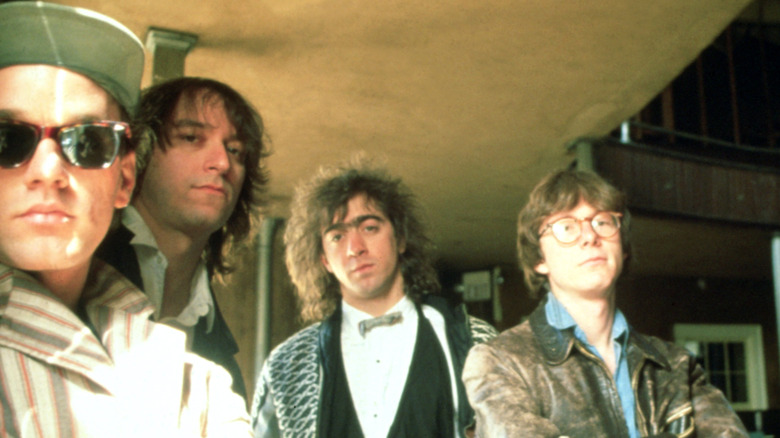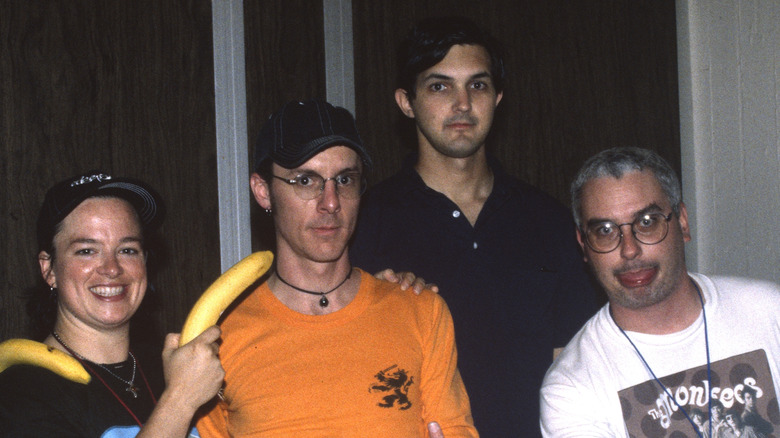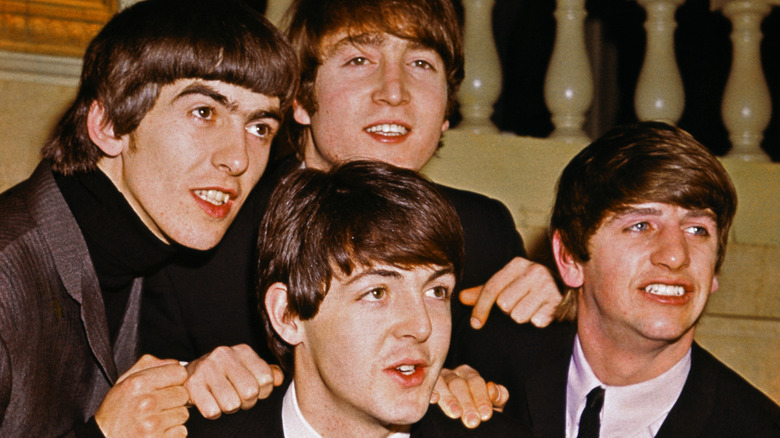Popular Rock Songs That Are Way Darker Than You Think
We may receive a commission on purchases made from links.
When a rock song becomes a hit, listeners tend to experience that tune over and over again. Despite the sonic familiarity that results after hearing a song repeatedly, fans — even those who wind up memorizing the lyrics — may not have a true understanding of what the track is actually about, let alone what inspired its composer to write it in the first place.
Sometimes, aficionados of a particular band may find themselves happily singing along to a favorite tune without realizing the actual meaning behind those lyrics. In some cases, those lyrics may reflect some truly grim undercurrents, and scratching the surface can sometimes reveal that the inspiration for beloved songs may be far from what was initially assumed. Fans of classic rock, for example, may not be aware of the unsettling inspiration behind The Doors' song "Riders On The Storm," which was spawned by the true story of a real-life serial killer.
The Doors haven't been the only rockers to mine a hit from such grisly sources. Other hit songs, in fact, have been based on some truly terrible stuff, from a classic Beatles song threatening murder to a head-bopping 1980s chart-topper that was inspired by a race riot. With that in mind, read further for a deep dive into some popular rock songs that are way darker than you think.
Nena: 99 Red Balloons
Initially a hit in Germany and Austria with the title "99 Luftballons," the 1983 single sprang from the self-titled debut album of Nena, a new wave band based in what was then known as West Berlin. The song took on a whole new life in the U.K. and the U.S. when the group's singer — also called Nena (real name: Gabriele Susanne Kerner) — rerecorded it with the lyrics translated into English, and then retitled "99 Red Balloons."
At the time, the Cold War was still raging. Berlin was cut in two by the infamous Berlin Wall, with Germany itself divided into democratic and communist halves. While the English version isn't as clear, the original German lyrics tell the story of someone releasing a bunch of helium-filled balloons as a lark — only to watch them drift over into East Berlin, accidentally becoming the catalyst for a nuclear apocalypse as the Socialist Unity Party reacted to the unexpected objects in the sky. However, anyone listening casually would experience a peppy pop ditty about colorful balloons, without realizing the song's true meaning.
Despite the song's grim subtext, it's become a staple of karaoke bars. "There's something about the sense of doom in that song that female karaoke singers seem to respond to," Rob Sheffield, long time Rolling Stone Contributing Editor and author of "Turn Around Bright Eyes: The Rituals of Love & Karaoke," told The New York Times. "There's so much drama built into it, with the slow introduction, the rocking part and then another slow part. It's a three-act operetta."
Red Hot Chili Peppers: Under the Bridge
American rock band Red Hot Chili Peppers broke through into the big leagues with the 1991 album "Blood Sugar Sex Magik," and the hit single "Under the Bridge." The song originated from a poem that the band's frontman, Anthony Kiedis, had written about his experience as a teenager, recalling the loneliness and detachment he felt while spiralling into drug addiction. That's evident in the song's signature lyric, "Sometimes I feel like my only friend / Is the city I live in / The City of Angels / Lonely as I am / Together we cry."
In his lyrics, Kiedis looks back on a specific experience, when he crossed into gang-controlled territory in Los Angeles to buy heroin and cocaine in order to feed his addiction. "That song came about because, during the course of my life, I was what you might call a hardcore junkie for many years," Kiedis said in a video interview on YouTube. "And during that point in my life was a very sad time. Everything that was beautiful and precious and sacred to me took a back seat as this need for this chemical dependency just got more disgusting and insane."
Appearing on "The Joe Rogan Experience," Kiedis admitted that the song remains a very personal and powerful touchstone for him. "Yeah, it's a meaningful tune," he mused.
Foster the People: Pumped Up Kicks
Released in 2011, indie-pop group Foster the People's "Pumped Up Kicks" hit No. 3 on the Billboard Hot 100, remaining on the chart for an impressive 40 weeks. It's an uptempo, high-energy song, and it's easy to get caught up in the dance-friendly beat while glossing over its disturbing undertones. The song tells the story of a teenager named Robert, who finds his father's gun in a closet, and then imagines "all the other kids" running from him and his "six-shooter."
"'Pumped Up Kicks' is about a kid that basically is losing his mind and is plotting revenge," the song's writer, Mark Foster, told now-defunct music magazine Spinner UK (via E! News). "He's an outcast. I feel like the youth in our culture are becoming more and more isolated. It's kind of an epidemic. Instead of writing about victims and some tragedy, I wanted to get into the killer's mind, like Truman Capote did in 'In Cold Blood.'"
While the song was pulled off the radio airwaves after the tragic 2012 Sandy Hook school shooting, Foster has insisted that's actually not about a mass shooting incident. "I think people filled in the blanks that it was about a school shooting, but I never say anything about a school in the song," Foster told Billboard in 2022. "It's really more about this person's psyche. Obviously the song is speaking about violent things, but it is a misconception that it's about a school shooting."
Eddie Grant: Electric Avenue
"Now in the street there is violence, and a lots of work to be done," sings Eddie Grant in the opening line of "Electric Avenue." Unbeknownst to many of those who bopped around to the 1982 hit, Grant was telling the story of a the Brixton riots, when citizens of the predominantly Black neighborhood in London revolted over the heavy-handed racism doled out by white police officers.
Grant watched the chaos unfold on television and, sometime later, was driving through Brixton when he saw a street sign that read, "Electric Avenue" (so named because it was the first market street in London to be illuminated with electricity). "What a fantastic song title," Grant recalled thinking, sharing the memory in a 2018 interview with The Guardian. "The song was intended as a wakeup call," he added.
However, it's a safe bet that the American teenagers who watched the songs's music video on MTV, which placed it on heavy rotation, would have likely had no knowledge of the Brixton riots, or the fact that there is a real-life street called Electric Avenue. Even Frank Agarrat, the sound engineer who recorded the song with Grant, had no clue, assuming the moniker was metaphorical. "I couldn't believe it," Agarrat told The Guardian. "I never knew it was a real street."
Third Eye Blind: Jumper
While Third Eye Blind is best known for 1997 hit "Semi-Charmed Life," the group's 1998 single "Jumper" soared to No. 5 on the Billboard Hot 100. A hard-driving rocker, the song has a far darker undercurrent, involving themes such as mental illness and suicide.
Interviewed by PBS series "Soundcheck," the band's frontman and songwriter, Stephan Jenkins, discussed its origins and how he came to be inspired to write it. "'Jumper' is actually kind of a noir," Jenkins explained. "It's what I would have said to a kid who jumped off the Coronado Bridge in San Diego ... who was getting bullied because he was gay in high school."
While that may seem particularly bleak for a rock song, Jenkins insisted that there was also a sense of optimism and hope underlying the whole thing, the idea that, despite our differences, humans are more alike than dissimilar. "The message of the song is, without asking for anything, like even if we never see each other again, we all have more understanding for each other than we may give ourselves and give each other credit for," he said.
Blind Melon: No Rain
The mere mention of early-1990s rock band Blind Melon elicits the musical memory of "No Rain," the 1992 earworm that became a massive hit. Anyone humming the familiar melody may feel a nostalgic smile starting to form, but that belies the true nature of the song's lyrics.
The song wasn't written by singer Shannon Hoon — who died in 1995 of an overdose — but by Blind Melon's bassist, Brad Smith. As Smith recalled when interviewed for Greg Prato's book, "Facts on Tracks: Stories Behind 100 Rock Classics!" (via Alternative Nation), the song was written before Blind Melon formed, after he'd moved to Los Angeles from Mississippi. At the time, Smith knew nobody in the city, and was working construction while trying to launch himself as a musician. On the weekends, he'd would busk for spare change at Venice Beach in hopes of assembling enough coins to buy a meal.
"And it was inspired by just how tough it was in LA. I had bouts of depression ..." Smith said of the song's central theme. "So the song is about not being able to get out of bed and find excuses to face the day when you have really, in a way, nothing. It was like rock bottom. I wasn't even on drugs or drinking. It was just tough. It was just a tough point in my life."
Nirvana: Polly
"Polly" made its debut on Nirvana's groundbreaking 1991 album "Nevermind," with the band resurrecting it for the 1993 live album, "MTV Unplugged in New York." The lyrics are disturbing, to say the least. "Polly wants a cracker / I think I should get off her first /I think she wants some water / To put out the blow torch," sings frontman Kurt Cobain in the opening lines of the acoustic track.
Cobain's inspiration was a disturbing crime committed by serial rapist Gerald Friend. Back in 1960, Friend was arrested and sentenced to life in prison after kidnapping and sexually assaulting a 12-year-old girl in Tacoma, Washington. After serving 20 years of that sentence, Friend was paroled. In 1987, he abducted a 14-year-old girl and sexually assaulted her. She managed to escape before he could kill her, with Friend sent back to prison for life, with no possibility of parole. The victim sued the state's Department of Corrections for releasing him early. Cobain read those newspaper reports, and imagined Friend's POV for "Polly."
"That song 'Polly', it's a true story," Nirvana bassist Krist (then Chris) Novoselic told NME in a 1991 interview. "It's about a young girl who was abducted. The guy drove her around in his van. Tortured her. Raped her. The only chance she had of getting away was to come on to him and persuade him to untie her. That's what she did, and she got away. Can you imagine how much strength that took?"
Matchbox Twenty: 3AM
Released as a single in 1997, Matchbox Twenty's "3AM" quickly climbed the charts; more than a quarter-century later, the song sits at No. 3 on Billboard's list of "greatest of all time adult alternative songs." Written by the band's frontman, Rob Thomas, the song is built around the chorus, "And she says, Baby it's 3 a.m., I must be lonely / Well, yeah, when she says, Baby, well, I can't help but be scared of it all sometimes."
Clearly, with lyrics like that, "3AM" is not a cheery song. However, its inspiration is actually far darker than fans likely imagined. While introducing the song when the band appeared on "VH1 Storytellers," Thomas explained that it was written about his experience when he was 12 or 13 years old. "My mom had cancer," he said. "She's okay now, but it was a weird period to be that age, and have to take care of yourself, and take care of your mom ... 'Why does mom sleep all the time?' You don't get it. And that was the song that came out of it."
Death Cab for Cutie: I Will Possess Your Heart
The Police struck radio gold in 1983, with the trio's first (and only) No. 1 hit, a song that casual listeners assumed was a poignant love song. However, the hidden meaning of The Police's "Every Breath You Take" is far darker, about a possessive, stalker-ish lover.
More than two decades later, Death Cab for Cutie trod similar terrain with its 2008 hit "I Will Possess Your Heart." For those who look, the song's intent is right there in the title of a song that's essentially about a one-sided relationship in which a guy becomes obsessed with someone who's indifferent to him, and vows to change that. "You know, it's this terrific kind of creepy, stalker anthem in which [Death Cab for Cutie frontman] Ben Gibbard sings about, you know, waiting outside of his beloved's home ..." explained Washington Post music critic Josh Freedom du Lac during an appearance on NPR.
"The song is basically about a stalker," Gibbard told Paste Magazine in a 2018 interview, confirming that "I Will Possess Your Heart" is indeed an ode to obsession. "It's about this nice guy who wants this girl he can't have, and he believes they'll be together once she realizes how great he is — he just has to wait it out. That's the part that makes the song really creepy, the delusion of thinking that they were meant to be together. It's a really dark song."
R.E.M.: The One I Love
While fans may wonder what ever happened to R.E.M. after the band's breakup in 2011, the hit songs they recorded over the course of their three-decade career continue to resonate. Among those hits is the 1987 single "The One I Love," which hit No. 9 on the Billboard Hot 100 back in 1987. The title certainly implies it's a love song, as do the opening lyrics: "This one goes out to the one I love / This one goes out to the one I've left behind."
"Well, it wasn't a love song," R.E.M. guitarist Peter Buck told the Hartford Courant. "'The One I Love' is an anti-love song, but since 'the one I love' is in the title ... we used to play it, and I'd look into the audience, and there would be couples kissing. Yet the verse is, 'This one goes out to the one I love / A simple prop to occupy my time.' That's savagely anti-love."
Frontman Michael Stipe, in fact, almost didn't record the song because he felt it was too dark. In an interview with now-defunct Q magazine (via Far Out), he described the "The One I Love" as "really violent and awful," and just "too brutal.
Toadies: Possum Kingdom
In 1994, grunge band Toadies released "Possum Kingdom," telling the story of an unsuspecting dude who meets a mysterious woman who lures him onto a dark path. According to Toadies frontman Vaden Todd Lewis, he'd been watching a lot of horror movies at the time the idea for the song hit him.
"I've always been a big horror fan — the cheesier the better," Lewis told American Songwriter, explaining that he'd envisioned the song's scenario in his mind. "He's kind of attracted to a girl, and she invites him to this crazy party that's basically a cult," he said. "I was thinking, 'What is this guy going to do next,' so he decides to go, and of course, you'd want somebody to hang out, so he tries to lure the next person (a woman) into the cult, and that's what 'Possum Kingdom' is about."
Lewis set the song at Possum Kingdom Lake, an actual man-made body of water in Texas. As a result, many listeners came to believe that Lewis was singing about real-life events; over time, this led to an urban myth about a serial killer roaming around the lake, murdering victims while still on the loose. That, confirmed Lewis, is utter nonsense. "I just made it up," he told Texas Monthly.
The Beatles: Run for Your Life
Infused with a hint of country twang, "Run For Your Life" is a straight-ahead rocker from The Beatles' "Rubber Soul" album, a catchy, peppy toe-tapper — that just happens to be a misogynist celebration of domestic abuse. The hidden meaning of The Beatles' "Run for Your Life" is right there in the lyrics, jealous John Lennon singing that if he ever catches his significant other with another man, she'd better run. Heck, the opening line is, "Well, I'd rather see you dead, little girl, than to be with another man."
Years later, Lennon himself admitted he wasn't terribly fond of the song — although not for any of the reasons mentioned above. "I never liked 'Run For Your Life,' because it was a song I just knocked off," he explained in a 1970 interview with Rolling Stone, revealing it was inspired by a line in Elvis Presley's "Baby Let's Play House."
A decade later, Lennon confronted his troubled history when he told Playboy that he actually was an abusive boyfriend in his younger years. "I used to be cruel to my woman, and physically — any woman. I was a hitter. I couldn't express myself and I hit," he said, referencing lyrics in the song "Getting Better. "I am a violent man who has learned not to be violent and regrets his violence," Lennon added. "I will have to be a lot older before I can face in public how I treated women as a youngster."
